Show Your Work! is a book for people who hate the very idea of self-promotion. It’s the followup to my New York Times bestseller, Steal Like An Artist — if Steal was a book about how to be more creative by stealing influence from others, Show is a book about how to influence others by letting them steal from you.
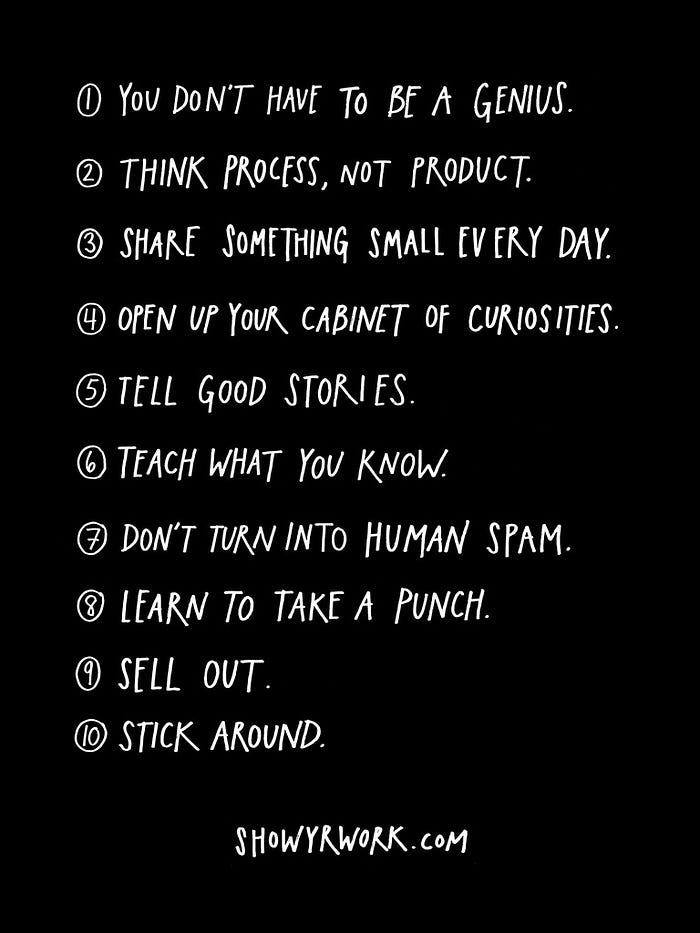
1. You don’t have to be a genius.
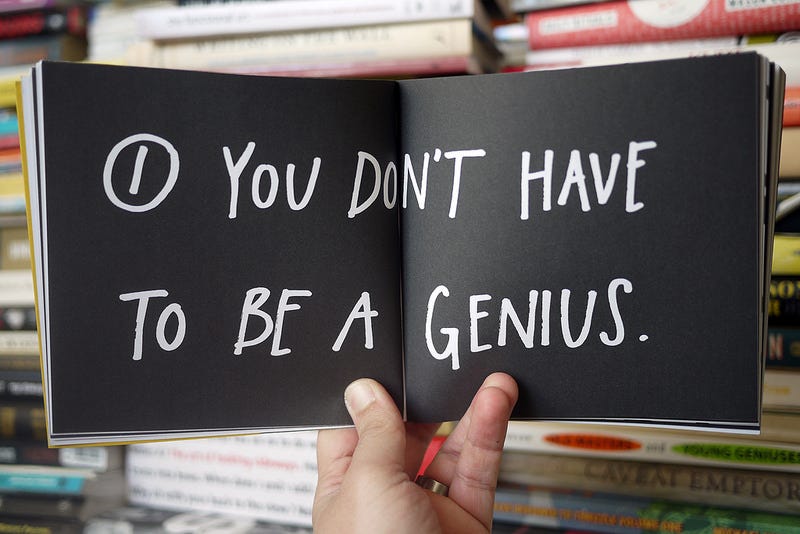
“Find your voice, shout it from the rooftops, and keep doing it until the people that are looking for you find you.”
— Dan Harmon
We’re always being told find your voice. When I was younger, I never really knew what this meant. I used to worry a lot about voice, wondering if I had my own. But now I realize that the only way to find your voice is to use it. It’s hardwired, built into you.
If you want people to know about what you do and the things you care about, you have to share. Talk about the things you love. Your voice will follow.
2. Think process, not product.
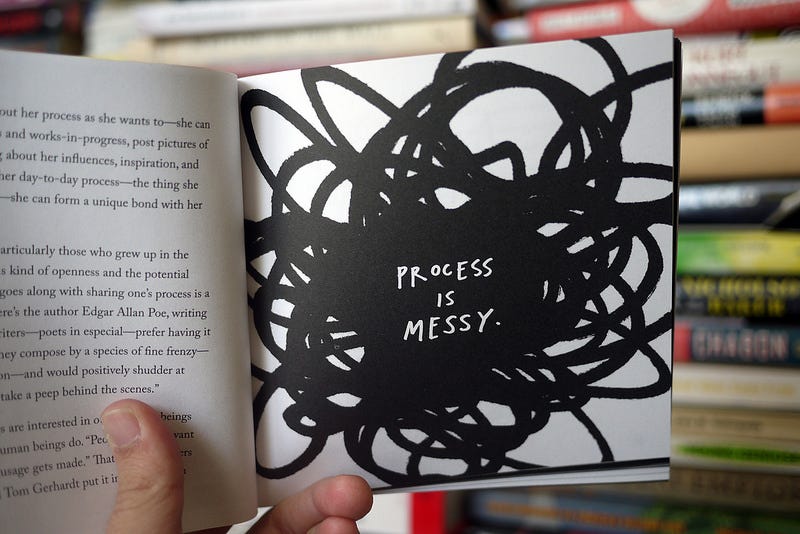
“A lot of people are so used to just seeing the outcome of work. They never see the side of the work you go through to produce the outcome.”
—Michael Jackson
Traditionally, we’ve been trained to regard the creative process as something that should be kept to ourselves. We’re supposed to toil in secrecy, keeping our ideas and our work under lock and key, waiting until we have a magnificent product to show before we try to connect with others.
But human beings are interested in other human beings and what other human beings do. By sharing our process, we allow for the possibility of people having an ongoing connection with us and our work, which helps us move more of our product.
3. Share something small, every day.
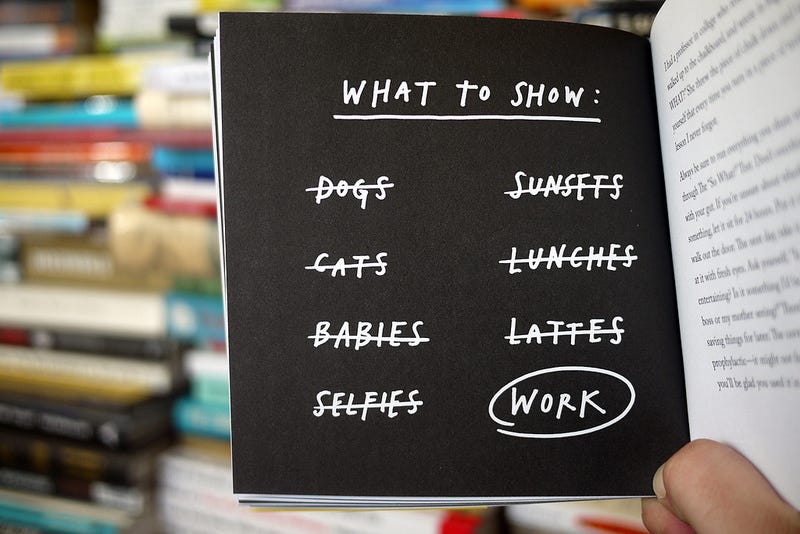
“Put yourself, and your work, out there every day, and you’ll start meeting some amazing people.”
—Bobby Solomon
Once a day, after you’ve done your day’s work, find one little piece of your process that you can share. Where you are in your process will determine what that piece is. If you’re in the very early stages, share your influences and what’s inspiring you. If you’re in the middle of executing a project, write about your methods or share works in progress. If you’ve just completed a project, show the final product, share scraps from the cutting-room floor, or write about what you learned.
Don’t say you don’t have enough time. We’re all busy, but we all get 24 hours a day. People often ask me, “How do you find the time?” And I answer, “I look for it.” You might have to miss an episode of your favorite TV show, you might have to miss an hour of sleep, but you can find the time if you look for it.
4. Open up your cabinet of curiosities.
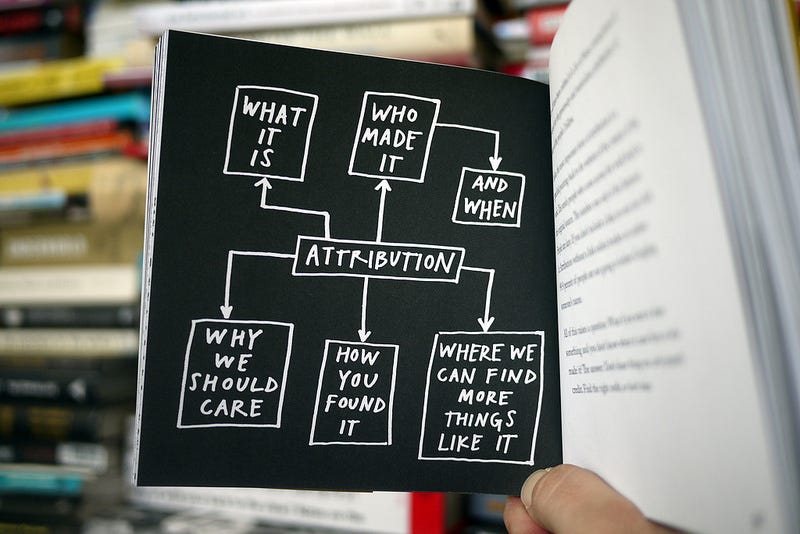
“Do what you do best and link to the rest.”
—Jeff Jarvis
If you’re not ready to take the leap of sharing your own work with the world, you can share your tastes in the work of others.
Where do you get your inspiration? What sorts of things do you fill your head with? What do you read? Do you subscribe to anything? What sites do you visit on the Internet? What music do you listen to? What movies do you see? Do you look at art? What do you collect? What’s inside your scrapbook? What do you pin to the corkboard above your desk? What do you stick on your refrigerator? Who’s done work that you admire? Who do you steal ideas from? Do you have any heroes? Who do you follow online? Who are the practitioners you look up to in your field?
Your influences are all worth sharing because they clue people in to who you are and what you do.
5. Tell good stories.

“You got to make your case.”
—Kanye West
Artists love to trot out the tired line, “My work speaks for itself,” but the truth is, our work doesn’t speak for itself. Human beings want to know where things came from, how they were made, and who made them. The stories you tell about the work you do have a huge effect on how people feel and what they understand about your work, and how people feel and what they understand about your work effects how they value it.
You should be able to explain your work to a kindergartner, a senior citizen, and everybody in between. Everybody loves a good story, but good storytelling doesn’t come easy to everybody. It’s a skill that takes a lifetime to master. So study the great stories and then go find some of your own. Your stories will get better the more you tell them.
6. Teach what you know.

“The impulse to keep to yourself what you have learned is not only shameful, it is destructive. Anything you do not give freely and abundantly becomes lost to you. You open your safe and find ashes.”
—Annie Dillard
The minute you learn something, turn around and teach it to others. Share your reading list. Point to helpful reference materials. Create some tutorials and post them online. Use pictures, words, and video. Take people step-by-step through part of your process. As Kathy Sierra says, “Make people better at something they want to be better at.”
Teaching people doesn’t subtract value from what you do, it actually adds to it. When you teach someone how to do your work, you are, in effect, generating more interest in your work. People feel closer to your work because you’re letting them in on what you know.
7. Don’t turn into human spam.

“It’s all about paying attention. Attention is vitality. It connects you with others.”
—Susan Sontag
If you’re only pointing to your own stuff, you’re doing it wrong. If you want fans, you have to be a fan first. If you want to be noticed, you have to notice. Shut up and listen once in a while. Be thoughtful. Be considerate.
If you want followers, be someone worth following. Don’t be creepy. Don’t be a jerk. Don’t waste people’s time. Don’t ask too much. And don’t ever ever ask people to follow you. “Follow me back?” is the saddest question on the Internet.
8. Learn to take a punch.
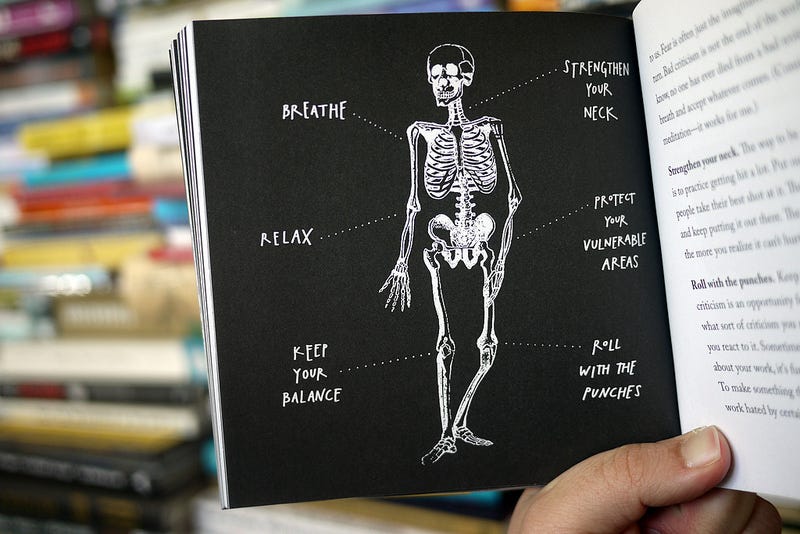
“I ain’t going to give up. Every time you think I’m one place, I’m going to show up someplace else. I come pre-hated. Take your best shot.”
—Cyndi Lauper
When you put your work out into the world, you have to be ready for the good, the bad, and the ugly. The more people come across your work, the more criticism you’ll face.
The way to be able to take a punch is to practice getting hit a lot. Put out a lot of work. Let people take their best shot at it. Then make even more work and keep putting it out there. The more criticism you take, the more you realize it can’t hurt you.
9. Sell out.
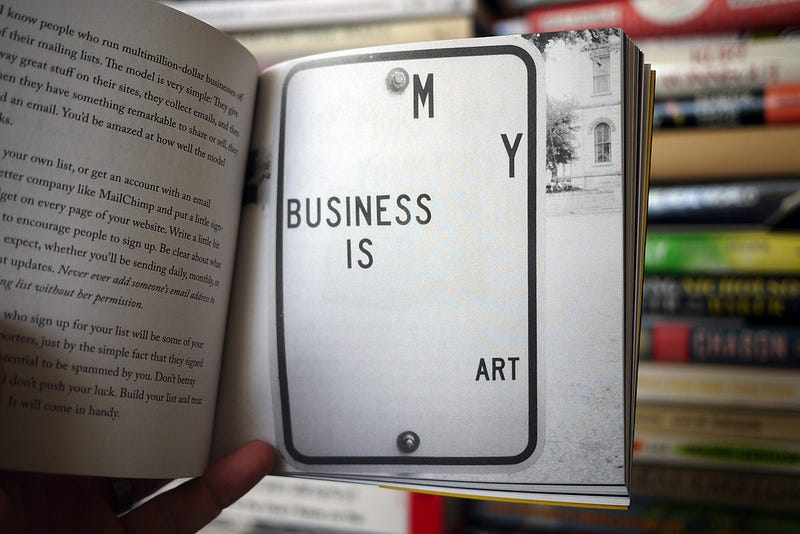
“Sellout . . . I’m not crazy about that word. We’re all entrepreneurs. To me, I don’t care if you own a furniture store or whatever—the best sign you can put up is SOLD OUT.”
—Bill Withers
The word sellout is spit out by the bitterest, smallest parts of ourselves. Some awful people use the term sellout to include any artist who dares to have any ambition whatsoever. They’ll say you’re a sellout if you try to make it outside your hometown. They say you’re a sellout if you buy better equipment. They’ll say you’re a sellout if you try anything new at all.
Yet a life of creativity is all about change—moving forward, taking chances, exploring new frontiers.
So be ambitious. Keep yourself busy. Think bigger. Expand your audience. Don’t hobble yourself in the name of “keeping it real,” or “not selling out.” Try new things. If an opportunity comes along that will allow you to do more of the kind of work you want to do, say Yes. If an opportunity comes along that would mean more money, but less of the kind of work you want to do, say No.
10. Stick around.

“Work is never finished, only abandoned.”
—Paul Valéry
Every career is full of ups and downs. When you’re in the middle of living out your life and career, you don’t know whether you’re up or down or what’s about to happen next. “If you want a happy ending,” actor Orson Welles wrote, “that depends, of course, on where you stop your story.”
It’s very important not to quit prematurely. The people who get what they’re after are very often the ones who just stick around long enough.
You can’t plan on anything; you can only go about your work, as Isak Dinesen wrote, “every day, without hope or despair.” You can’t count on success; you can only leave open the possibility for it, and be ready to jump on and take the ride when it comes for you.
Fuente: https://medium.com/
No comments:
Post a Comment